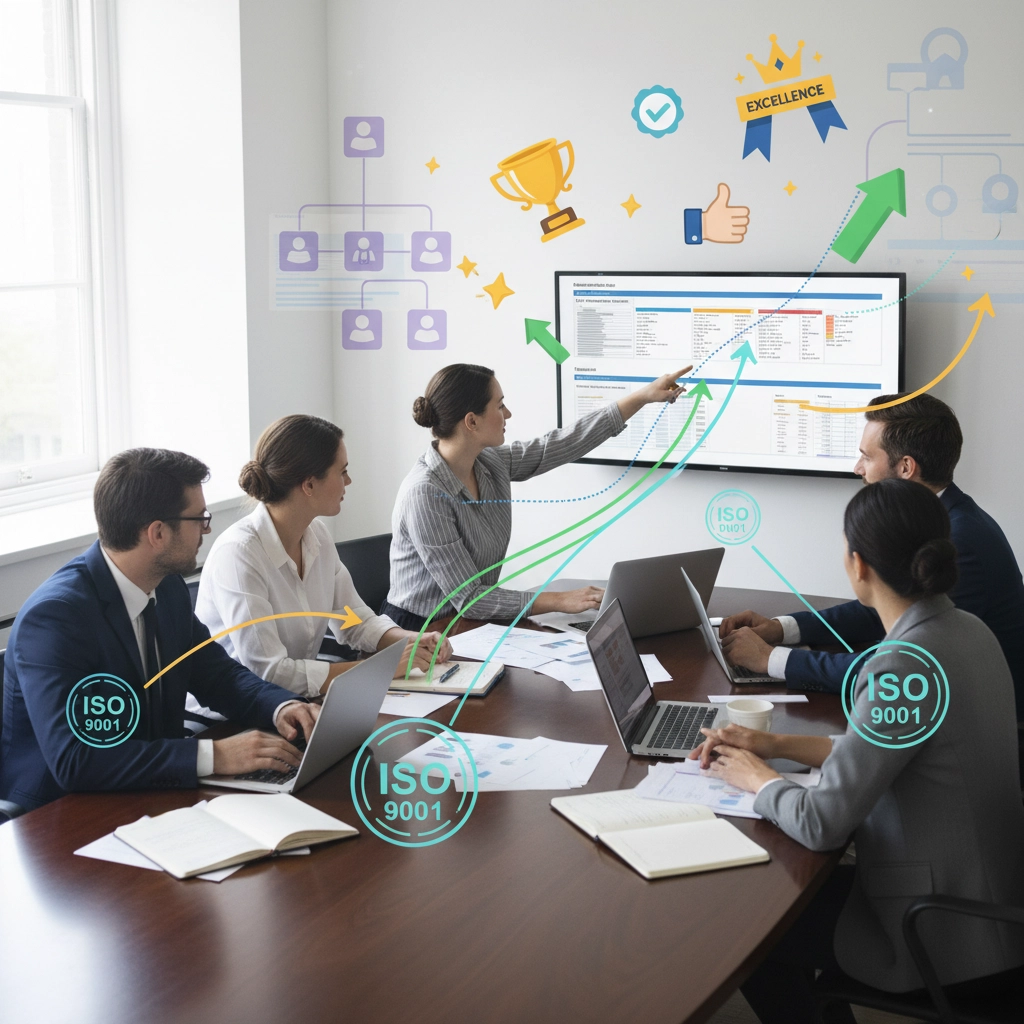
ISO Standards Made Easy: The Small Business Path to 9001, 27001, and 42001 Success
0
0
0
Feeling overwhelmed by ISO standards? You're definitely not alone! Most small business owners hear "ISO certification" and immediately think of mountains of paperwork, endless bureaucracy, and costs that could sink their budget. But here's the thing – ISO standards aren't the business boogeyman they're made out to be. In fact, they're your secret weapon for building customer trust, streamlining operations, and future-proofing your company.
Let's break down the three powerhouse standards that are transforming small businesses: ISO 9001 (quality management), ISO 27001 (information security), and ISO 42001 (AI management). By the end of this guide, you'll see exactly how these standards can work together to take your business to the next level – without breaking the bank or your sanity!
What Are These ISO Standards Actually About?
Think of ISO standards as your business's personal trainer – they help you build stronger, more efficient operations that customers can trust. Let's demystify each one:
ISO 9001: Your Quality Management Champion
ISO 9001 is like having a quality control expert on your team 24/7. It's the world's most popular business standard, and for good reason – it helps you deliver consistent, high-quality products and services every single time. The beauty? It doesn't tell you HOW to run your business; it just helps you do whatever you're already doing, but better and more consistently.

ISO 27001: Your Information Security Bodyguard
In today's digital world, data breaches can devastate small businesses. ISO 27001 is your shield against cyber threats, helping you protect sensitive customer information, financial data, and business secrets. It's not about becoming a security expert overnight – it's about implementing smart, manageable practices that keep your business safe.
ISO 42001: Your AI Management Guide
As artificial intelligence becomes more common in business operations, ISO 42001 helps you use AI responsibly and effectively. Whether you're using AI chatbots, automated systems, or data analysis tools, this standard ensures you're managing AI risks while maximizing benefits.
Why Small Businesses Are Winning with ISO Standards
Build Instant Credibility
Nothing says "we take quality seriously" like ISO certification on your website and business cards. Customers immediately recognize these standards as marks of professionalism and reliability. You'll stand out from competitors who haven't taken this step!
Streamline Your Operations
Here's a secret: most small businesses are already doing 70-80% of what ISO standards require. The certification process simply helps you document and improve what you're already doing well. It's like organizing your toolbox – everything works better when it's in the right place.
Open New Market Doors
Many large companies and government contracts require ISO certification from their suppliers. Getting certified doesn't just improve your current operations – it unlocks opportunities you couldn't access before.
Step 1: Start with ISO 9001 – Your Foundation for Success
For most small businesses, ISO 9001 is the perfect starting point. Here's your roadmap:
Get Familiar with the Standard
Don't worry – you don't need a law degree to understand ISO 9001! The 2015 version was specifically designed to be more accessible for small businesses. Grab a copy and read through it. Focus on understanding the big picture first, then dive into details.
Conduct Your Gap Analysis
This sounds fancy, but it's really just asking: "What are we already doing well, and where do we need to improve?" Most small businesses discover they're closer to compliance than they thought. It's incredibly encouraging!

Document Your Processes
This is where the magic happens. You're not creating new processes – you're simply writing down what you already do. Think of it as creating a recipe book for your business success. When team members know exactly how things should be done, quality becomes automatic.
Step 2: Layer on ISO 27001 for Information Security
Once you've got ISO 9001 under your belt, adding ISO 27001 makes perfect sense. Here's why it's easier than you think:
Assess Your Current Security Practices
You probably already have more security measures in place than you realize. Password policies, backup procedures, and access controls – these all count! ISO 27001 helps you identify gaps and strengthen what's already working.
Implement Smart Security Controls
The standard provides a menu of security controls, but you don't need to implement them all. Choose the ones that make sense for your business size and risk level. It's about being smart, not perfect.
Step 3: Future-Proof with ISO 42001
As AI becomes more prevalent in business, ISO 42001 ensures you're ahead of the curve:
Identify Your AI Usage
You might be using AI more than you think! Email filtering, website chatbots, automated scheduling tools – these all fall under AI governance. ISO 42001 helps you manage these tools responsibly.
Develop AI Governance Policies
This isn't about becoming a tech expert – it's about having clear policies for how your business uses AI tools safely and effectively.

Timeline and Investment: What to Really Expect
How Long Does This Actually Take?
Here's some encouraging news: the average ISO certification takes about 4 months. Some focused businesses with expert guidance have achieved certification in just 30 days! The key is having a clear plan and the right support.
What's the Real Cost?
For ISO 9001, you're looking at approximately $5,700 to $15,000 for preparation and implementation, plus $3,000 to $5,000 for the external certification audit. While this might seem significant, consider it an investment that pays dividends through:
Increased customer confidence
Improved operational efficiency
Access to new markets
Reduced errors and waste
The Smart Implementation Strategy
Right-Size Your Approach
The beauty of ISO standards is their flexibility. Your QMS should work for a 5-person company just as well as a 50-person company – just scaled appropriately. Don't overcomplicate things!
Leverage Existing Systems
You don't need to throw out everything and start fresh. ISO standards are designed to enhance what you're already doing. Use your current tools, processes, and team knowledge as the foundation.
Get Expert Guidance When You Need It
While you can tackle ISO certification on your own, working with experienced consultants can dramatically speed up the process and ensure you get it right the first time. The Expertise team specializes in helping small businesses navigate ISO certification efficiently and cost-effectively.

Putting It All Together: Your Action Plan
Phase 1: Foundation Building (Months 1-2) Start with ISO 9001 gap analysis and documentation. This builds your quality management foundation and gets your team comfortable with ISO thinking.
Phase 2: Security Integration (Months 3-4) Layer in ISO 27001 requirements, building on the process documentation and management systems you've already created.
Phase 3: AI Governance (Months 5-6) Add ISO 42001 components, focusing on responsible AI use and governance policies.
The Compound Effect
Here's what most small businesses don't realize: these standards work together beautifully. The process documentation from ISO 9001 supports your ISO 27001 security procedures. The risk management approach in ISO 27001 enhances your ISO 42001 AI governance. It's not three separate projects – it's one integrated system that makes your business stronger.
Your Next Steps to ISO Success
Ready to transform your small business with ISO certification? You don't have to figure this out alone. The journey from current operations to certified excellence is absolutely achievable with the right guidance and support.
Start by assessing where you are today – most small businesses are pleasantly surprised by how much they're already doing right. Then, create a realistic timeline that works for your business schedule and budget.
Remember, ISO certification isn't about perfection – it's about consistency, improvement, and building trust with your customers. Every step forward makes your business stronger and more competitive.
The Expertise team has helped dozens of small businesses successfully navigate ISO certification, often completing the process faster and more cost-effectively than they thought possible. Don't let another year pass wondering "what if" – take the first step toward ISO success today!
Which ISO standard resonates most with your current business needs? Are you ready to join the growing community of small businesses using ISO certification as their competitive advantage?

![[HERO] The Golden Ticket: How ISO 9001 Gives SMEs a Massive Competitive Edge](https://cdn.marblism.com/uPt4zGG3thO.webp)
![[HERO] Modern Quality: The Final Verdict on ISO 9001 for Today](https://cdn.marblism.com/vCHFmRN88Yb.webp)
![[HERO] Counting the Cost: What Does ISO 9001 Actually Cost an SME?](https://cdn.marblism.com/ds1Nz_9uzoX.webp)